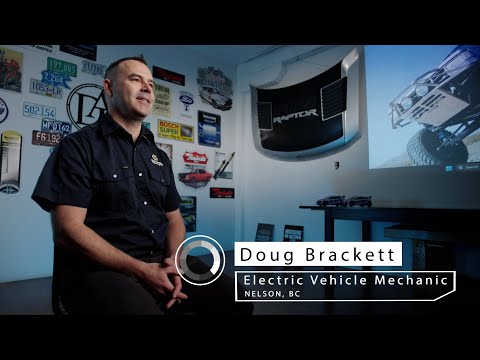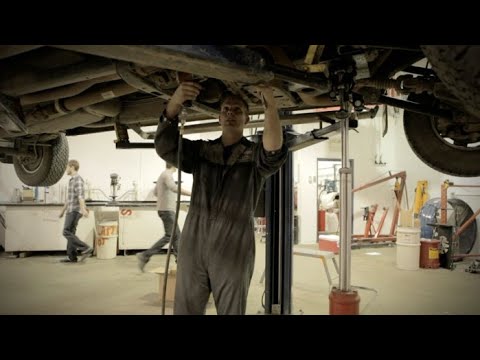Career Overview
Automotive service technicians, truck and bus mechanics and mechanical repairers work on cars, buses, and light and commercial transport trucks. They inspect, diagnose, repair and service mechanical, electrical and electronic systems and parts of vehicles. Mechanical repairers do major repairs of, and replace, mechanical units on newly built motor vehicles.
People in these occupations work for:
- Automotive service repair facilities
- Motor vehicle dealers
- Truck and trailer dealers
- Fleet maintenance companies
- Fleet rental providers
- Transportation companies
- Motor vehicle manufacturing companies
Job Titles
Duties
Automotive service technicians:
- Adjust, repair or replace parts or sections of automotive systems, using hand tools and other repair equipment. Examples of automotive systems are:
- Fuel systems
- Brakes
- Steering and suspension
- Engines and drive trains
- Emission control and exhaust
- Cooling and climate control
- Electrical and electronic systems
- Inspect and ensure the vehicle works well and meets the manufacturer’s specifications
- Road test motor vehicles
- Test automotive systems using computerized processes and other tools to find problems
- Test and adjust repaired systems to meet the manufacturer’s performance standards
- Perform scheduled and preventative maintenance services, such as oil changes and chassis lubrications
- Speak with customers to explain the work that was done and tell them about any future repairs that may be needed
- Review work orders and discuss work with the supervisor
Truck and bus mechanics:
- Adjust, repair or replace parts and sections of commercial transport truck systems, including:
- Chassis
- Frame
- Cab
- Body
- Engine and drive train
- Air brakes
- Steering
- Fuel, hydraulic, electrical and electronic systems
- Adjust, repair or replace parts and sections of truck-trailer/bus systems including structural, brake and electrical systems
Mechanical repairers (motor vehicle manufacturing):
- Inspect and test mechanical units, such as engines, transmissions, axles and brake systems
- Find problems and work with supervisors to decide whether to repair or replace units
- Repair or replace mechanical units or sections
- Record the problems that were found and any work done in reports
People in this career may specialize in the following areas:
- Electric vehicles
- Alternate fuel conversions and maintenance
- Transmission, engine and fuel systems
- Air conditioning, cooling and heating systems
- Steering, alignment, brakes, drive lines and suspension
- Electrical and electronic systems
- Truck-trailer repair or diagnostic services
- Vehicle networking and computer systems
Earnings
Earnings is income that workers receive in exchange for their labour. Depending on the type of employment, earnings can be in the form of wages (hourly), salaries (fixed monthly or annual) or self-employed earnings.
Work Environment
# Workers Employed
17,245% Employed Full Time
65%Automotive service technicians, truck and bus mechanics, and mechanical repairers usually work 35 to 40 hours per week. Some workers may need to be on call and available for emergency repairs since some service shops are open during evenings and weekends.
Workers with this career may work on a flat rate which means that they will be paid for the work done as outlined in the rates, not by the hour. For those who can work quickly and do a good job, they may be able to earn more this way than by being paid hourly.
Generally, people in these jobs work in automotive repair shops or garages. Those employed in smaller shops tend to have different duties than those who work in larger shops.
Automotive service technicians, truck and bus mechanics, and mechanical repairers must work well on their own and as part of a team. They should be able to troubleshoot, solve problems and have good communication and customer service skills. As well, they must have a good understanding of mechanical systems, engines and electronic equipment.
Most work settings have good air flow and are well-lit, but some shops may be drafty and noisy. This type of work is often done in small spaces and can be dirty. It involves a lot of bending, reaching, kneeling and lifting. Workers should know how to safely handle and use tools, equipment and chemicals. Use of personal protective equipment (PPE), including gloves, respirators, safety glasses and safety footwear must be worn.
Career Pathways
Automotive service technicians and truck and bus mechanics often begin their careers as shop hands or in other entry-level positions. With more training, workers can move from being automotive service technicians to truck and bus mechanics. Experienced workers may become service writers, a shop foreperson, a supervisor or start their own business.
With experience, mechanical repairers may move into supervisory positions in motor vehicle manufacturing. Mechanical repairers who complete an apprenticeship program may become vehicle mechanics.
Occupational Interests
It’s important to understand what kinds of occupations align with your interests.
For more about occupational interests visit Skills for the Future Workforce > Characteristics.
Here are the top occupational interest(s) for this career profile:
Education, Training and Skills
A secondary school diploma is generally needed to work as an automotive service technician, truck and bus mechanic or mechanical repairer. A person typically needs to have a driver’s licence to be hired. Some positions may require a specific class of licence.
Certification is not required to work as an automotive service technician in B.C. Those who wish to be certified must complete a four-year apprenticeship program. The B.C. government is introducing skilled trades certification beginning with a total of 10 trades, including automotive service technicians. Certification will be implemented in phases between 2022 and 2024. Learn more about skilled trades certification.
Apprenticeship programs
Work experience and in-class instruction are part of apprenticeship programs. Some part-time and online programs may be available. To apprentice, workers must be sponsored by an employer. A person who successfully completes an apprenticeship program and the final certification exam earns a Certificate of Qualification. Workers with significant experience in the trade may be able to challenge the certification exam in order to earn the Certificate of Qualification without completing a formal apprenticeship. For more information on earning a Certificate of Qualification, visit SkilledTradesBC.
To work in other provinces
Automotive service technicians may need Red Seal certification. This can be earned by passing an exam and proving significant work experience.
Workers coming to B.C.
Automotive service technicians who are certified by a regulator elsewhere in Canada can apply for the same certification from the regulator in B.C. Under the terms of the Canadian Free Trade Agreement (CFTA), most applicants who are transferring their credentials from elsewhere in Canada will not be required to complete additional training or testing. However, the B.C. regulator may ask applicants to provide further information such as a letter of good standing, references or a criminal record check.
Workers who trained outside of Canada
Automotive service technicians who trained outside of Canada and have never received certification from a Canadian jurisdiction will likely need a full assessment. Most occupational regulators have a process for assessment and recognize internationally trained applicants. Contact SkilledTradesBC for details on how to apply for certification in B.C.
For information about labour mobility in Canada, visit www.workersmobility.ca.
View a list of Professional Regulatory Authorities in B.C.
Education programs in B.C.

Top Skills
Every job calls for a certain set of skills. Knowing those skills is the first step in finding a good career fit.
Here, you will find the 10 most relevant workplace skills. Some are more important to achieving success in a certain career than others. These skills may come naturally to you or you may need to gain them through education, training and experience.
See the list of work-related skills below, ranked in order of importance for this career. Check out the list and see if this career matches your skills—take that first step!
Repairing machines or systems using the needed tools.
Determining causes of operating errors and deciding what to do about it.
Watching gauges, dials or other indicators to make sure that a machine is working properly.
Performing routine maintenance on equipment and determining when and what kind of maintenance is needed.
Using logic and reasoning to identify the strengths and weaknesses of alternative solutions, conclusions or approaches to problems.
Conducting tests and inspections of products, services or processes to evaluate quality or performance.
Considering the relative costs and benefits of potential actions to choose the most appropriate one.
Controlling operations of equipment or systems.
Giving full attention to what other people are saying, taking time to understand the points being made, asking questions as appropriate, and not interrupting at inappropriate times.
Keeping track of and assessing your performance, other individuals, or organizations to make improvements or take corrective action.
Labour Market Statistics
Discover data, facts and information that have been gathered and analyzed. Learn about the characteristics of the economy and labour market in B.C.
Employment
Find out about employment types and trends by region and industry.
Employment
17,245Employment by Region







| Region | Employment | % Employment of this Occupation |
|---|---|---|
| Cariboo | 985 | 5.7% |
| Kootenay | 725 | 4.2% |
| Mainland/Southwest | 9,380 | 54.4% |
| North Coast and Nechako | 445 | 2.6% |
| Northeast | 465 | 2.7% |
| Thompson-Okanagan | 2,625 | 15.2% |
| Vancouver Island/Coast | 2,625 | 15.2% |
Labour Market Outlook
The B.C. Labour Market Outlook is a 10-year forecast of the expected supply and demand for labour in the province. It’s usually updated every year. The purpose is to provide British Columbians with the knowledge to make informed decisions on careers, skills training, education and hiring.
Forecasted Job Openings (2025-2035)
4,940Forecasted Job Openings
Forecasted Employment Growth Rate
Composition of Job Openings
Job Openings by Region (2025-2035)







| Region | Job Openings | Avg. Annual Employment Growth |
|---|---|---|
| Cariboo | 180 | -0.1% |
| Kootenay | 210 | 0.0% |
| Mainland/Southwest | 2,850 | 0.7% |
| North Coast and Nechako | 80 | -0.6% |
| Northeast | 80 | -0.5% |
| Thompson-Okanagan | 570 | -0.1% |
| Vancouver Island/Coast | 970 | 1.0% |
Industry Highlights
Learn about the opportunities in B.C.'s major industries, including employment trends, earning potential, locations of work and more.
Forecasted Job Openings by Industry
| Industry | Job Openings (2025-2035) |
|---|---|
| Repair, Personal and Non-Profit Services | 2,500 |
| Retail Trade | 980 |
| Transportation and Warehousing | 500 |
| Wholesale Trade | 190 |
| Public Administration | 130 |
Insights from Industry
For these career paths, job opportunities often come up as people leave the industry or retire. New job opportunities also come from the need to serve a growing population.
One growth area is with shops that service vehicles after the warranty has expired. These shops do oil changes or provide fast, low-cost maintenance on brakes and mufflers, for example.
Keeping up to date on new technology for motor vehicles and repair equipment is important in this career. Workers with specialized, up-to-date skills are in greatest demand.
Resources
-
Automatic Transmission Rebuilders Association (ATRA)www.atra.com
-
Automotive Industries Association (AIA) of Canadawww.aiacanada.com
-
Automotive Retailers Association (ARA)www.ara.bc.ca
-
BuildForce Canadawww.buildforce.ca/en
-
National Automotive Trades Association of Canada (NATA)www.natacanada.ca
-
Red Seal Programwww.red-seal.ca/eng/welcome.shtml
-
SkilledTradesBCskilledtradesbc.ca/
-
Uniforwww.unifor.org









